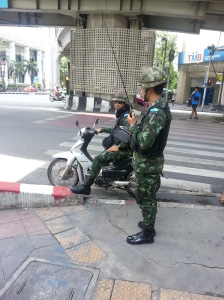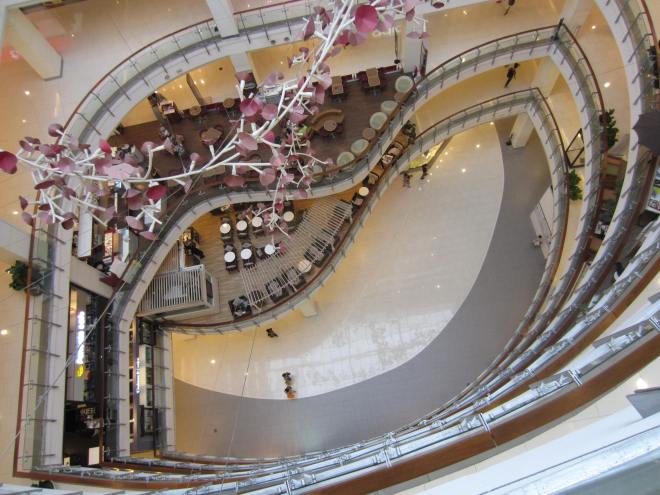
On a day of announced protests last Sunday, police and soldiers mostly just hung around a busy intersection that is flanked by high-end malls.
It was only on the day after our arrival in Thailand that we saw any soldiers — four of them routinely directing normally busy traffic. No one paid attention to them, and they were as casual and seemingly bored as supermarket cashiers.
On Sunday, our fifth and final day in Bangkok, however, the announcement of protests scheduled for busy intersections and upscale malls, a few of which were closed, resulted in a show of force. By closing two Skytrain stations and gathering at intersections, the authorities kept protests to a minimum and hardly inconvenienced tourists, except those hoping to browse the shuttered malls.
I remember reading about a single arrest, for someone using two fingers in a peace sign as her presumed symbol of objection to the military coup. (I may have missed a couple of others.)
Certainly, martial law is appalling to those of us who embrace democracy, but it was not easy to detect during our stay. I ran into someone back in Phnom Penh who told me that a military presence was obvious outside the capital.
In any case, the journalists who swarmed to the big intersection near two Skytrain stations with their Skywalks had little to do Sunday morning but wait for violence that never occurred.
Otherwise, Lin and I encountered not a single obvious scintilla of concern by Bangkok’s residents. They seemed to be carrying on their daily lives as if nothing had changed, yet appearances have to be deceiving.
It may have been the original 10 p.m. curfew, lifted to midnight on my birthday, or it may have been the restaurant, but I should add that only some four or five tables were occupied for the fancy buffet we enjoyed.
As we all know, something momentous did change. And it is troubling that an advanced culture is ruled by leaders whom no one elected: generals.
Martial law as practiced in Bangkok didn’t seem all that different from our strongman’s rule here, where freedom of assembly is banned, elections are rigged and opposition parties have been unable to unseat the prime minister of 29 years or squelch widespread corruption.
During our stay in Bangkok, to which I have traveled twice before — I was stunned to see in my passport that the last occasion was 10 years ago — we walked and walked, took boats along the river, went to several temples to see world-renowned Buddhas, ate wonderful street food, visited the royal palace, hiked through Chinatown and shopped ’til we dropped.
In addition, I noticed a great number of differences between Phnom Penh and Bangkok, among them:
- Paved roads that seem to be cleaned daily, no dust and no lasting trash despite rare garbage receptacles;
- Dizzying number of soaring modern buildings;
- Designer clothing that is not counterfeit but is plenty expensive;
- An astonishing array of electronics in gleaming, gargantuan malls, also filled with boutiques and astonishingly diverse, expansive and inviting food courts;
- Openly gay lives along with proud “lady boys”;
- Street food of commendable quality (including memorable fried chicken), low prices ($3 dinner for two) and wide variety, plus no end of conventional restaurants;
- Spicy food that isn’t Chinese;
- Worship not only of Buddha but also of Shiva;
- Relatively few roving vendors;
- Smiles less freely offered, though far from absent;
- Extremely good medical care — I decided spontaneously to have a complete physical, including lab tests, a chest x-ray, half hour with a wonderful physician, snack, lunch and escorts from station to station for a fifth of the expense in New York City;
- Great public transportation;
- Traffic that travels the “wrong” way;
- Beautifully preserved temples;
- Sidewalk markets selling presumably fake merchandise;
- Touts selling sex with printed “menus” in the Patpong district, which lures tourists from points far and wide;
- An atmosphere of far greater sophistication, better dress and an air of confidence;
- Not so many homeless folks, beggars and working children;
- Countless 7-11 stores and numerous Starbucks, both of which are nonexistent here;
- Prices of ordinary goods not so different from Phnom Penh.
 Regarding street food, I was stuck by the efficient rotation of “restaurants” in the same sidewalk spaces. The owners seem to switch off for breakfast, lunch, supper and dinner, wedging all their cooking supplies and provisions onto carts that they trundle to and from spots that have been allocated by a system that eludes me.
Regarding street food, I was stuck by the efficient rotation of “restaurants” in the same sidewalk spaces. The owners seem to switch off for breakfast, lunch, supper and dinner, wedging all their cooking supplies and provisions onto carts that they trundle to and from spots that have been allocated by a system that eludes me.
Their efficiency is remarkable. We spotted the enshrouded carts in the photo at left early one morning on the narrow street beside our hotel; I’m guessing they are destined to provide street food around the corner at some point during the day. Or, it is possible that they contained goods sold at night on a main street perhaps 40 meters away.
Below you’ll find a number of photos in no particular order showing aspects of our little vacation from our extended vacation:











Yeah, there’s been no real changes here in CM!
LikeLike
Wonderful blogging, Malcolm, did you notice that it’s not just the food vendors that switch off? Along Sukhumvit, at least, there are three shifts for the clothing and nick-nack vendors as well. Some stay for all three shifts, some come and with the food vendors, most all give way to after-hour street bars. Great for people watching. You point about the lack of roaming vendors was very astute, one I had not previously considered, but recognized as true in an instant.
LikeLike
That’s great information, Jim. Thanks for pointing out that situation, which, no, I hadn’t noticed.
LikeLike